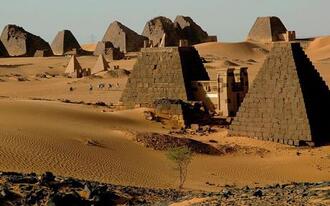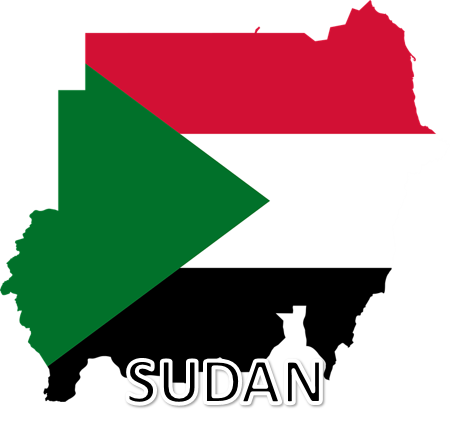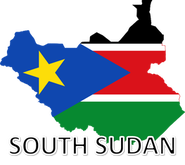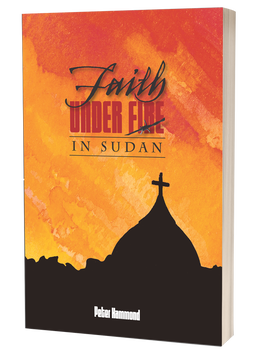 Cush To the Egyptians, Sudan was known as the land of Cush: the source of ivory, incense, ebony, gold and slaves. Sudan was subjected to numerous Egyptian trading and raiding forays until the 8th century BC. Then Cush grew to be a great power, and under their King Piankhi the Cushites conquered Egypt in 712BC. The Assyrians later invaded and seized Egypt from Cushite control in 671BC. Meroe The influences of Egypt, Greece, Rome and India are evident in the temples, tombs and pyramids built in Northern Sudan. The cursive Meroetic script of the Cushite kingdom still remains undeciphered and so most of its history remains mysterious. Axum
In 23BC an invasion force of Romans - 800 cavalry and 10,000 infantry - swept into Sudan, sacked the capital Napata and annexed a large part of Nubia. The Romans withdrew in 297AD. Then the Christian Axumite kingdom of Ethiopia invaded and ensured the fall of the ailing Meroe kingdom. Over the next centuries the three kingdoms of Northern Sudan were converted to Christianity. Their united efforts blunted the first wave of Muslim invaders in the 7th century. Subsequent Islamic efforts to conquer or convert the Nubian Christian kingdoms failed. Ottoman Turks It was only in the 13th century that internal Christian squabbling and massive Arab immigration brought about the demise of Christianity and the rise of Islam in Northern Sudan. The Ottoman Turkish influence increased from the 16th century on. Mamluk Invasion At the beginning of the 19th century the Ottoman ruler of Egypt, Mohammed Ali, launched a series of attacks on Sudan. Mohammed Ali was a ruthless and power hungry army officer who had gained control of Egypt with the help of the Mamluks, a mercenary military class who were originally Turkish slaves. Later when the Mamluk leaders posed a threat to Mohammed's power he eliminated them all by massacring them at a banquet he had called in their honour. Egyptian Control Mohammed's 25-year-old son, Ismail, was sent off with 10,000 men to raid Sudan. Ismail's troops were promised 50 cents for every human ear they brought back. 3,000 ears and 30,000 slaves were sent back to Cairo on the first caravan (although only half of the slaves survived the journey). The Sudanese then counter-attacked, and Ismail died a fiery death in his own tent. Mohammed retaliated with more invasions, and by 1823 over 50,000 Sudanese had been killed. Sudan was now firmly under Egyptian control. General Gordon With the building of the Suez canal and Egyptian bankruptcy, Britain became the dominant power in both Egypt and Sudan. In 1873 the Christian General, Charles Gordon, was appointed governor - first of Equatoria province, then in 1877 of all of Sudan. General Gordon's campaign to stamp out the Islamic slave trade created a crisis. The Muslim community was enraged and declared that "the suppression of slavery was against the principles and traditions of Islam". Open rebellion erupted. The Mahdi A local Muslim leader, Mohammed Ahmad, declared himself "Mahdi" (a military messiah selected by Allah to lead a "Jihad" or holy war). The Mahdiyya Movement which resulted has continued to influence Islamic politics in Sudan to this day. The Mahdi besieged Kordofan and starved the inhabitants into submission. His forces then rampaged throughout Sudan. General Gordon made a courageous stand against all odds in Khartoum, which ultimately fell in 1885. The forces of the Mahdi were finally destroyed at the battle of Omdurman in 1898 and Sudan entered an almost 60-year period of peace where slavery was effectively suppressed. Civil War Along with independence in 1956, Sudan erupted into civil war - between the Arab North and the Black South. Military coups in the Muslim North in 1958 and 1969 only intensified the war. Then in 1972 the Addis Ababa Agreement temporarily ended the war by granting the South autonomy and religious freedom. Shari'a This uneasy peace was shattered in September 1983 with the dictator Col. Nimeiri's declaration of "Sharia" (Islamic law). Khartoum's liquor stocks were thrown into the Nile causing considerable pollution and the inebriation of many fish. SPLA John Garang (a graduate of Iowa State University) and a member of the Dinka tribe, then reactivated the Sudanese People Liberation Army (SPLA). Within 2 years the SPLA had 25 000 armed soldiers under its command. Their spectacular victories led to the Muslim military coups in 1985 and 1989, when the successive disgraced dictators were replaced by other frustrated Muslim leaders. By 2001 over 90% of Southern Sudan had been liberated by the SPLA rebels. Division In the early 1990's however, the rebels' position was substantially weakened by tribal infighting. The Muslim dictator, Lt. Gen. Omar Al-Bashir of the National Islamic Front (NIF), then took advantage of these divisions by launching a series of dry season offensives from 1992 onward. Independence These offensives have gained temporary ground (mainly towns) which inevitably are cut off and besieged by the rebels during the rainy season. South Sudan is now, since 2011, an independent state and remains as the oldest Christian community in Africa, a bulwark against the Southward advance of radical Islam. It is on the very frontline of the fight for faith and freedom. Dr. Peter Hammond Frontline Fellowship P.O. Box 74 Newlands 7725 Cape Town South Africa Tel: 021-689-4480 Email: [email protected]
0 Comments
Leave a Reply. |
More Articles
All
Archives
February 2021
|
"And Jesus came and spoke to them, saying, “All authority has been given to Me in heaven and on earth.
Go therefore and make disciples of all the nations, baptizing them in the name of the Father and of the Son and of the Holy Spirit,
teaching them to observe all things that I have commanded you; and lo, I am with you always, even to the end of the age.” Amen.” Matthew 28: 18-20
Go therefore and make disciples of all the nations, baptizing them in the name of the Father and of the Son and of the Holy Spirit,
teaching them to observe all things that I have commanded you; and lo, I am with you always, even to the end of the age.” Amen.” Matthew 28: 18-20
|
P.O.Box 74 Newlands 7725
Cape Town South Africa |
|



 RSS Feed
RSS Feed
